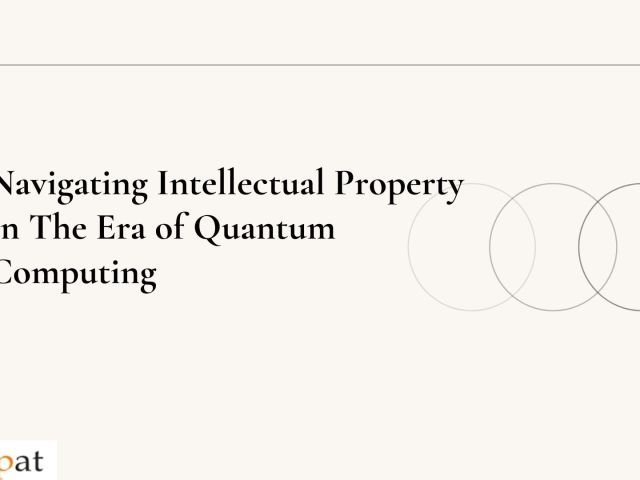The Department for Promotion of Industry and Internal Trade, Ministry of Commerce and Industry on the 22nd August, 2023 published “The Draft Patents (Amendment), Rules, 2023” (Draft Rules).
Patent applications and prosecution thereof is currently governed under the Patents Rules 2003 (2003 Rules). The 2003 Rules came in super session of the erstwhile Patents Rules, 1972 and provided an elaborate description of the filing procedure and allied actions. However, considering the gap of 20 years, there was a need to bring about certain amendments with the changing interpretations and dynamics of patent law. In this blog post, we analyze the changes that are stipulated under the draft rules.
Reduced Time Limits
The foremost amendment pertains to Rule 12 of the 2003 Rules which deals with the statement and undertaking regarding foreign applications under Section 8 of the Patents Act, 1970 (Patents Act). Particularly, under Rule 12 (2), the time within which the applicant for a patent is required to keep the Controller informed of other applications filed in any country apart from India, is six months from the date of such filing. However, the Draft Rules propose the time limit to be changed to two months from the date of issuance of first statement of objections.
Further, as per Rule 12(3), if the Controller sought information regarding any objection for novelty or patentability the same has to be furnished by the applicant within six months. The Draft Rules in comparison stipulate that the Controller is not required to consider the information that is already accessible on public databases. However, if required the Controller may also direct the applicant to furnish a fresh statement and undertaking in Form 3 within two months.
Rule 13 of the 2003 Rules requires a specific reference to the number of the original application from which the divisional application under Section 16 of Patents Act flows. Further to this, the Draft Rules propose that an applicant can file a divisional application under section 16, including in respect of an invention disclosed in the provisional specification.
As per Section 11B of the Patents Act, the Applicant must make a request for the examination of the patent application, whereby Rule 24B prescribes that this request should be made within forty-eight months from the date of priority of the application or from the date of filing of the application, whichever is earlier. The Draft Rules have proposed to reduce the time period from forty-eight months to thirty-one months, except for an application that was filed before the Draft Rules came into effect, whereby the request for such an application will be filed as per the time prescribed in the Patents (Amendment) Rules, 2006. As for Rules 24B(6) and 24C(11) of the 2003 Rules, the reliance on sub-rule 5 of Rule 24B and sub-rule 10 of Rule 24C will be removed and replaced with the respective sub-rules.
The Draft Rules do not only aim to reduce the timelines but have provided a grace period for an application under Section 31 with the provision of Form 31. This is proposed to be inserted as Rule 29A.
Opposition Proceedings
Regarding opposition to a patent, Rule 55 originally reads as “On consideration of the representation, if the Controller is of the opinion that application for patent shall be refused or the complete specification requires amendment, he shall give a notice to the applicant to that effect.” However, once the Draft Rules come into effect the provision will read as “On consideration of the representation, the Controller shall first decide the maintainability of the representation and thereafter if the Controller is of the opinion that application for patent shall be refused or the complete specification requires amendment, he shall give a notice to the applicant to that effect”, thus adding the requirement of maintainability of opposition to be incorporated before passing an order. Accordingly, the time limit granted to an application to file a response and evidence to such representation has been reduced from 3 months to two months.
The Draft Rules also stipulate that once the parties have made their submissions, the Controller will (within 3 months) either
- reject the representation and grant the patent; or
- accept the representation and refuse the grant of patent on that application,
Additionally, Rule 62(2) to Rule 62(4) and Rule 63 shall govern the procedure of hearings and any application in which a representation for opposition has been filed and found maintainable, shall be examined in accordance with rule 24C. The 2003 Rules require the Opposition Board to conduct the examination of the notice of opposition along with documents filed and submit a report with its joint recommendation within three months, which is now stipulated to be reduced to two months.
Renewal
The Draft Rules have proposed the addition of a proviso vis à vis the renewal fee to keep the patent in force under Section 53. While the annual renewal fees payable in respect of two or more years may be paid in advance, in cases where the renewal fees is paid in advance via e-filing in respect of a period of at least 4 years, a ten per cent reduction in fee will be applicable upon such a payment.
Patent Agent Exam
The Draft Rules seek to provide clarity on Patent Agent Exam, by clarifying that the Patents Act and Patent Rules refer to Patents Act, 1970, Patents Rules, 2003, Designs Act, 2000 and Designs Rules, 2001’. Further, patent specifications refers to patent specifications and design specifications.
Commercially Working the Patent
Section 146 (2) required every patentee and licensee to furnish statements regarding the extent to which the patented invention has been worked on a commercial scale in India in intervals of not less than six months. While the 2003 Rules only stipulate that the statements shall be furnished in respect of every calendar year within three months of the end of each year, the Draft Rules propose that the same shall be furnished once in respect of every period of three financial years, starting from the financial year commencing immediately after the financial year in which the patent was granted, and shall be furnished within six months from the expiry of each such period. However, the Controller retains the power to condone any delay.
General Extension of Time
Rule 138 of the 2003 Rules pertaining to the power to extend time prescribed is proposed to be substituted whereby the time prescribed by 2003 Rules for completion of an act or the taking of any proceeding can be extended by the Controller for a period of up to six months. This entirely rests upon the discretion of the Controller. Further , any request for extension of time under the new rule would have to be made before the expiry of the period of up to six months. Thus, the classification attached to different rules regarding extension of time is proposed to be removed with the addition of a general principle.
Change in Fee Structure
Lastly, the Draft Rules propose to change schedule I of the fee payable for prosecuting an application. The some of the changes are enumerated below:
- The column pertaining to “Small entity, alone or with natural persons and/or startup” is proposed to be removed. Thus under e-filing the category of “Natural person(s) or startup(s) or small entit(y)/(ies) or educational institution(s)” and “Other(s), alone or with natural person(s) or startup(s) or small entit(y)/(ies) or educational institution(s)” remains available.
- Item No. 9, pertaining to (i) On notice of opposition to grant of patent under section 25(2); and (ii) On filing representation opposing grant of patent under section 25(1) is proposed to incorporate aggregate amounts rather than a fixed fee.
- The fee for applications under section 28(2) has been removed whereas for those under sections 28(3) or 28(7) remains unchanged.
- Item No.14A and 14B are proposed to be removed along with changes in Item No. 13 and 14.
Further, the Draft Rules also propose to insert forms for Section 31 and rule 29A Grace period in the Second Schedule i.e. List of Forms. The new Form 1, Form 3, Form 4, Form 27 and Form 31 are also attached with the Draft Rules along with an amended Schedule IV.
Conclusion
The Draft Rules have reduced timelines for multiple actions for patent applications and prosecutions whereby the same can be seen as a stringent action to make the entire process more time effective and efficient. It is aimed at expediting grant of patent applications or even opposition proceedings. However, it cannot go unnoticed that a slight leeway flowing from the grace period that is stipulated can be a relief for applicants in certain circumstances. Additionally, there is a shift in the fee structure as well as structural changes in forms attached to the 2003 Rules. The Draft Rules also seek to clarify various aspects of the 2003 Rules.
The government has also sought objection or suggestions, if any, which can be addressed to the Secretary, Department for Promotion of Industry and Internal Trade, Ministry of Commerce and Industry, Government of India, Vanijya Bhawan, NewDelhi- 110001 or communicated by e-mail at bikram.87@nic.in and ipr-patents@gov.in. The Draft Rules can be accessed at https://egazette.gov.in/WriteReadData/2023/248296.pdf




